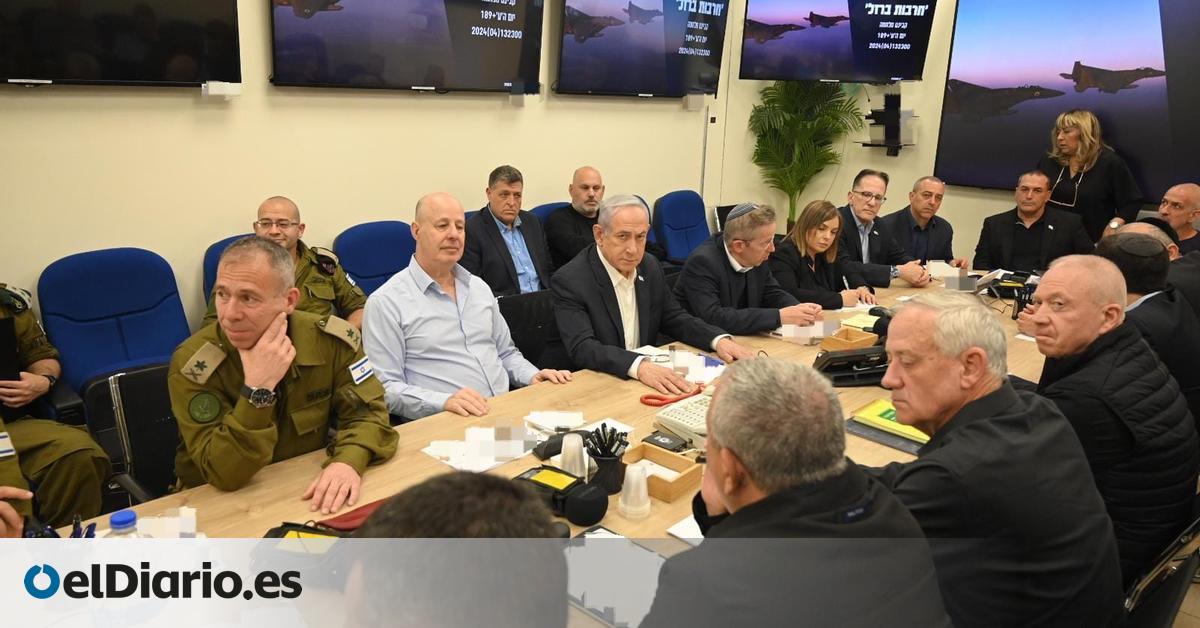
The so-called Israeli war cabinet, made up of only five members, including Prime Minister Benjamin Netanyahu, concluded its second meeting this Monday since Iran’s attack with hundreds of drones and missiles, without having reached a consensus on a possible retaliation against Tehran.
“Israel hopes to receive the support of the United States in any action it takes against Tehran,” says the Haaretz newspaper. Channel 12 reported that several options were discussed, all including a “painful” retaliatory strike against Iran, but one that would not trigger a regional war.
The war cabinet also aims to choose a response that will not be blocked by the US, the network said.
Israeli leaders have not revealed their intentions, more than 24 hours after the Iranian attack, in response to the Israeli attack on the Iranian embassy in Damascus that caused 13 deaths. The Iranian attack caused no fatalities and only hit an Israeli military base. The Army of this country assured that the vast majority of the drones and missiles launched from Iranian soil were intercepted and destroyed.
The French president considered that Israel has the right to defend itself and assured that it must find a way to do so proportionately. In that sense, he proposed that it carry out “bombings of (Iranian) military interests in a calibrated manner to put an end to this situation.” “We have to be on Israel’s side, but ask for proportionality in the response,” Macron said in an interview on BFMTV television.
Macron added that the attack was a response “to an action by Israel against an Iranian diplomatic headquarters in Damascus,” but considered it “disproportionate.”
The British Prime Minister, Rishi Sunak, declared this Monday before the House of Commons that threats to stability are increasing around the world, not just in the Middle East: “I want to be clear, nothing that has happened in the last 48 hours affects our position on Gaza. Hunger, desperation, loss of life on a horrific scale, the entire country wants the bloodshed to end and more humanitarian aid to arrive. The recent increase in aid flows is positive, but remains insufficient. “We need to see new crossings open for longer, to bring in vital supplies.”
The German Foreign Minister, Annalena Baerbock, for her part, warned Israel this Monday about a possible military response against Iran, because “retaliation does not appear in international law,” although she reiterated her condemnation of Tehran: “A attack (by Israel), because retaliation has no place in international law”
German Chancellor Olaf Scholz condemned the unprecedented Iranian attack against Israel that “should not have happened” ever, and urged both Tehran and the Government of Benjamin Netanyahu to contribute to a “de-escalation” of tensions.
“I repeat my warning: Iran cannot continue managing (the situation) like this. That is why it is important that everything is done to achieve de-escalation on the ground.”
Asked about a possible Israeli retaliation, the German chancellor indicated that the way in which Israel has managed to repel the Iranian attack with the cooperation of regional and international partners has been “very impressive.”
Arabs call for diplomatic offensive
Arab countries, including Iran’s neighbors and those mediating to stop the war in Gaza, have in recent hours multiplied contacts among themselves and with the United States and Tehran to prevent violence in the Middle East from getting out of control after the attack. unprecedented Saturday against Israel, reports Efe.
Iraq, Saudi Arabia and Jordan, as well as Egypt and Qatar, the latter two key mediators in the conflict between Israel and the Palestinian Islamist group Hamas, have led a series of diplomatic contacts for that purpose during the night from Sunday to Monday, according to the media. officers.
Russia and China call for dialogue
The Kremlin on Monday called on Israel and Iran to resolve their differences “exclusively” through diplomatic means. “We advocate that all differences be resolved exclusively through political and diplomatic means,” said Kremlin spokesman Dmitri Peskov. Peskov stressed that the Kremlin, a close ally of Iran, is “extremely concerned” about the recent escalation of tension in the Middle East.
For its part, China once again called on all parties for “restraint” on Monday after the launch of dozens of drones and missiles by Iran against Israel.
Foreign Ministry spokesperson Lin Jian also called on the international community, “especially influential countries,” to play “a constructive role in maintaining regional peace and stability.” EFE
Iran will also respond
Iran does not want tensions to rise, but it will respond immediately and more forcefully than before if Israel retaliates, Iranian Foreign Minister Hossein Amirabdollahian told his British counterpart on Monday, according to Iranian state media cited by The Guardian.
Source: www.eldiario.es

